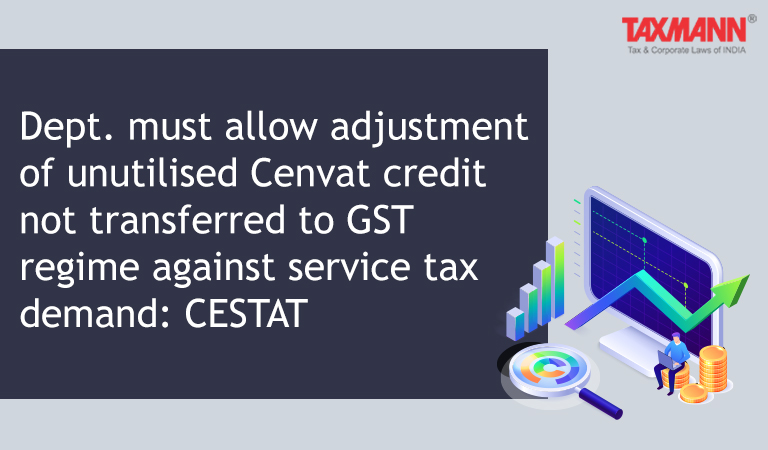Dept. must allow adjustment of unutilised Cenvat credit not transferred to GST regime against service tax demand: CESTAT
- Blog|News|GST & Customs|
- 2 Min Read
- By Taxmann
- |
- Last Updated on 15 November, 2021

Case Details: Uttaranchal Cable Network v. Commissioner, Customs, Central Excise & Service Tax - [2021] 132 taxmann.com 95 (New Delhi - CESTAT)
Judiciary and Counsel Details
-
- Anil Choudhary, Judicial Member
- Rajesh Chhibber, Adv. for the Appellant.
- Pradeep Gupta, AR for the Respondent.
Facts of the Case
The appellant was in the business of ‘Cable Operator’ service. The appellant was registered under the Service Tax regime. However, it didn’t choose to carry forward or to migrate cenvat credit to the GST regime, being the closing balance as on 30.06.2017. Pursuant to carrying an examination of the data of the appellant, a SCN was issued demanding service tax as short paid. The appellant didn’t contest the demand of service tax and requested to adjust unutilised CENVAT credit against the demand payable. The department informed that such adjustment of service tax as prayed was not allowable and it filed appeal against the same.
CESTAT Held
The Honorable CESTAT observed that cenvat credit lying unutilised as on 30.06.2017 would have been carried forward to GST regime as per provisions of Section 140 of the CGST Act. However, there is no bar or disability under Section 140(1) read with Section 142 of CGST Act, 2017 on an assessee for claiming adjustment of the tax demand from the unutilised cenvat credit lying to the credit as on 30.06.2017, which has not been carried forward to the GST regime. Therefore, it was held that the appellant would be allowed to make adjustment of the unutilised amount of cenvat credit against the demand payable.
Disclaimer: The content/information published on the website is only for general information of the user and shall not be construed as legal advice. While the Taxmann has exercised reasonable efforts to ensure the veracity of information/content published, Taxmann shall be under no liability in any manner whatsoever for incorrect information, if any.

Taxmann Publications has a dedicated in-house Research & Editorial Team. This team consists of a team of Chartered Accountants, Company Secretaries, and Lawyers. This team works under the guidance and supervision of editor-in-chief Mr Rakesh Bhargava.
The Research and Editorial Team is responsible for developing reliable and accurate content for the readers. The team follows the six-sigma approach to achieve the benchmark of zero error in its publications and research platforms. The team ensures that the following publication guidelines are thoroughly followed while developing the content:
- The statutory material is obtained only from the authorized and reliable sources
- All the latest developments in the judicial and legislative fields are covered
- Prepare the analytical write-ups on current, controversial, and important issues to help the readers to understand the concept and its implications
- Every content published by Taxmann is complete, accurate and lucid
- All evidence-based statements are supported with proper reference to Section, Circular No., Notification No. or citations
- The golden rules of grammar, style and consistency are thoroughly followed
- Font and size that’s easy to read and remain consistent across all imprint and digital publications are applied



 CA | CS | CMA
CA | CS | CMA
